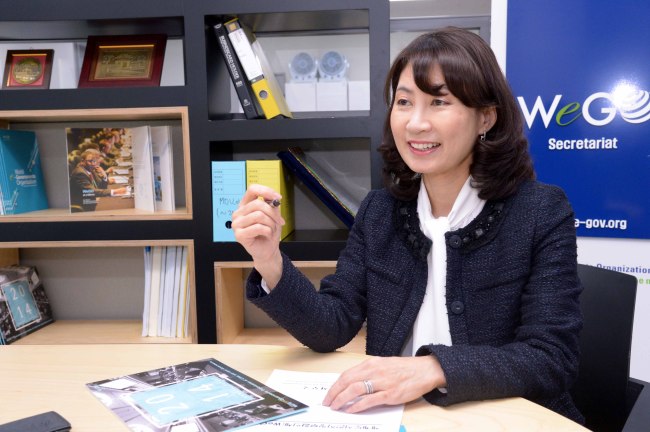[Herald Interview] ‘Digital capacity crucial for city’s sustainable development’
WeGO secretary-general vows to widen support for e-government systems in developing countries
By KH디지털2Published : Feb. 24, 2016 - 15:14
Running a constructive e-government system is crucial for municipalities to pursue sustainable development and ensure civic democracy, said the head of an international cooperative body for digital governance.
“The importance of the government’s online services is growing as it plays a crucial role in helping cities to pursue sustainable development. It not only provides a new source of economic growth with innovative technology but also strengthens democracy by attracting citizens to participate in policymaking and keeping information transparent,” Nam Young-sook, secretary-general of the World e-Governments Organization of Cities and Local Governments, said in an interview with The Korea Herald.
“The importance of the government’s online services is growing as it plays a crucial role in helping cities to pursue sustainable development. It not only provides a new source of economic growth with innovative technology but also strengthens democracy by attracting citizens to participate in policymaking and keeping information transparent,” Nam Young-sook, secretary-general of the World e-Governments Organization of Cities and Local Governments, said in an interview with The Korea Herald.

The e-government refers to a system using information technology and digitizing administrative affairs to effectively offer public services and improve interaction among agencies, and between the government and citizens.
Established in 2010 by Seoul Metropolitan Government, WeGO has promoted administrative efficiency and sustainable development of global cities by sharing digital government know-hows and bridging the digital divide. This is the first multinational city-led organization dedicated to information and communications technologies for public administration.
Nam, an economist and former international relations professor at Ewha Womans University, was named to the post last month.
As of this year, a total of 95 cities -- including Paris, Berlin, San Francisco, Hong Kong and Barcelona -- and two friendship organizations have joined the group. Once the cities join the organization, they can benefit from various programs ranging from e-government consulting to training workshops.
Seoul City was reelected a president city last year for the third consecutive time in recognition of its advanced digital government technology and systems. South Korea has topped the United Nations’ e-government survey three times, in 2010, 2012 and 2014. It also ranked the first for six consecutive years in the Rutgers World e-Governance Survey conducted by Rutgers University in the United States.
“The central government’s active efforts to provide customized digital administrative service for the public and its policy to share information have played a major role in getting the world’s recognition,” Nam said.
The state has been active in promoting the online government system with various measures.
It has allowed residents to have their personal documents -- such as birth certificates -- issued or change their residence address online without visiting public institutions. It has also run a “complaint report system” that receives public complaints via mobile applications and social network services.
Regardless of the central government’s efforts, the role of each municipality is essential in ensuring that citizens benefit from the e-government system, Nam stressed.
“Although the main policies of the e-government system are mapped out by the central government, it is the cities that carry out and deliver the public services based on the distinguished needs of each city. The municipalities connect the citizens and the central government,” she added.
As the new leader of the organization, Nam is pushing to widen WeGo’s role in promoting a “smart sustainable city” -- a sustainable city development based on the e-government system -- and in supporting developing countries to better adopt the e-government system.
“One of our main goals this year is to expand the support for member cities to enhance their digital capacity with various programs while tightening the cooperation with other international bodies for better global networks,” she added.
The organization is gearing up to raise the digital capacity of member cities such as Vietnam, Nepal and the Philippines.
“Although we have seen high demand from many cities, most of those which ran the trial programs could not introduce the e-government system due to the financial burden,” she added.
Member cities can apply for WeGo to conduct a feasibility study in their countries. This involves a customized on-site consulting program that runs a trial online system for six months and advises how to efficiently utilize the e-government system. About a dozen cities received the free consulting but none of them were able to afford the actual introduction of the system.
As part of efforts to solve the funding issue, WeGO has built partnerships with the Export-Import Bank of Korea and the Korean International Cooperation Agency to financially support member cities so that they will be able to run the system.
The organization is also preparing a series of training and workshop programs.
It is planning to cohost a “smart city forum” with the United Cities and Local Governments Asia-Pacific, the local government union of 140 Asia-Pacific cities, at the United Nations Conference on House and Sustainable Urban Development or Habitat III, in Ecuador in October.
The Habitat III is a conference held to “reinvigorate” the global political commitment to the sustainable development of towns, cities and other human settlements.
It will also co-host a workshop with the Asian Development Bank in May in Korea, and a “smart city regional forum” with International Telecommunication Union, the U.N’s specialized agency for information and communication technologies, on July I in Phuket, Thailand.
“While providing various network and training programs, WeGo will put more effort to offering more funding schemes based on tighter ties with international bodies such as the World Bank and ADB,” the secretary-general said.
By Lee Hyun-jeong (rene@heraldcorp.com)







![[Graphic News] More Koreans say they plan long-distance trips this year](http://res.heraldm.com/phpwas/restmb_idxmake.php?idx=644&simg=/content/image/2024/04/17/20240417050828_0.gif&u=)
![[KH Explains] Hyundai's full hybrid edge to pay off amid slow transition to pure EVs](http://res.heraldm.com/phpwas/restmb_idxmake.php?idx=644&simg=/content/image/2024/04/18/20240418050645_0.jpg&u=20240419100350)







![[KH Explains] Hyundai's full hybrid edge to pay off amid slow transition to pure EVs](http://res.heraldm.com/phpwas/restmb_idxmake.php?idx=652&simg=/content/image/2024/04/18/20240418050645_0.jpg&u=20240419100350)

![[Today’s K-pop] Illit drops debut single remix](http://res.heraldm.com/phpwas/restmb_idxmake.php?idx=642&simg=/content/image/2024/04/19/20240419050612_0.jpg&u=)